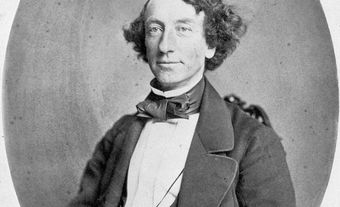Political History
Political history is the study of the processes, activities and institutions of governments, the influences on them and the individuals involved with them. Political historians traditionally examined and documented the deeds of monarchs and prime ministers, of politicians and parties, of governments and related institutions. More recently, however, political historians and political scientists have been preoccupied with broader questions linked to the exercise of power within society, such as the attempts of interest groups to determine policies, the circulation of ideas and ideologies and their influence in the political arena, and the impact of increasing intervention by governments in society (see Political Science).
While biography has remained important for understanding and explaining our political history, it has been supplemented by examinations of nearly every facet of Canadian political life. In the process our perception of Canada's political evolution has had to be adjusted to encompass such things as the views of working people and of ethnic and linguistic minorities, the role of women in society, the impact of social and political reform movements, etc. The horizons of political history have been broadened forcibly in the historians' effort to understand and explain the practice of power within Canadian society. Thus Canadian political history no more than begins with the study of politicians and parties.
The modern political historian attempts to find and follow the various threads of Canadian life - economic, social and cultural - that have affected Canadian politics through time and bear on the historian's understanding of political events. Certain issues have been of perennial concern to Canadian politicians and are of current interest to historians. For example, Canada is a vast, resource-rich but lightly populated land which, especially after the mid-19th century, invited politicians to build platforms around programs of national economic expansion. For Sir John A. Macdonald and Sir Wilfrid Laurier, this meant industrializing central and eastern Canada through protectionism, while colonizing the West by railway construction and massive immigration. For John Diefenbaker, economic expansion signified support for the opening of Canada's North, while for Brian Mulroney, it meant signing a Free Trade Agreement with the United States.
Political parties have long used economic themes as a means of uniting Canadians. Confederation, for instance, was promoted as, among other things, a solution to British North America's economic woes. But economic questions have often bitterly divided Canadians. For example, railway construction could be presented as necessary to open up the nation and to further trade, but questions as to how many lines should be built, whether they should be privately or publicly owned, and what the federal government's railway policy should be have divided Canadians (see Railway History). A policy of "national" development, such as the protective tariff, could be presented to the people as good for everyone; it not only offered manufacturers a more or less captive market but also created needed jobs for workers. More recently defenders of Free Trade argued that the agreement would not only guarantee markets for Canadian manufacturers but also create new jobs for workers and reduce prices for consumers. The many potentially divisive economic issues have been at the heart of most federal-provincial disputes (see Federal-Provincial Relations).
A large and diverse territory also fostered the growth of regional economies whose interests have been exceedingly difficult to harmonize (see Regional Economics). The exploitation of natural resources was promoted as certain to enrich the entire country, but when it has come time to divide up the profits, national unity has always been sorely taxed. It is scarcely surprising that Canadian economic and political unity has obsessed federal politicians. Federal parties, to gain power, have had to build coalitions of classes and regional interest groups whose goals are often contradictory. Moreover, provincial governments have seen themselves as more attuned to local and regional interests and have thus often been obliged to defend those interests against federal intrusion.
Other influences on political development, and therefore of interest to political historians, include religion, once the primary factor affecting the citizen's vote. Issues such as the denominational schools questions (see Catholicism; Separate Schools) and Temperance have often been the subject of acrimonious political debate. As education came to be seen as a necessity, politicians at all levels had to elaborate policies to reform traditional institutions, revamp curricula, train teachers, and increase funding and access to educational institutions. Industrialization made it necessary to protect workers and improve working conditions, and governments had to intervene increasingly in disputes between workers and employers.
The spectre of unemployment made it necessary to define policies that would not only alleviate misery but would support workers' buying power for economic reasons. urbanization changed the needs of Canada's population. Citizens' health became an important question, and governments began to assume an active role in improving medical and hospital care and facilitating access to it. Some debates have centered on housing, urban and regional planning, municipal and regional organization, child care, women in the labour force, consumer protection and crime. Lobbies and interest groups have developed to promote specific policies. Finally, in the 1990s particularly, the need to curtail mushrooming budget deficits have made it necessary to diminish the presence of the state in many sectors of activity. The ensuing cuts in spending have provoked acrimonious debate.
Population characteristics have also greatly influenced Canadian politics. The existence of a French-speaking minority constituting about 30% of Canada's population, largely concentrated within Québec, has had special implications for the debate on Canadian unity. On the one hand, many French Canadians have perceived the interests of their society as being clearly different from the interests of Canada as a whole. For them, Canadian unity has meant assimilation and the destruction of the foundations of French Canadian culture (see French-Canadian Nationalism).
On the other hand, the "two nations" (deux nations) debate, with roots in the mid-19th century (see Durham Report) and one of the most controversial themes in Canadian politics during the 1960s and 1970s, has tended to becloud the cultural heterogeneity of English-speaking Canada and in particular seemed to accord little importance to the increasingly numerous other ethnic groups as well as Indigenous Peoples. While many English-speaking Canadians responded by putting forth the notion of provincial equality, many French-speaking Canadians living in Quebec called for sovereign status for their province. Politicians have usually found it easier to unite French Canada than English Canada around a cause. Indeed, outside of war and, perhaps, opposition to separatism in Québec, there has been no issue powerful enough to unite a large majority of English-speaking Canadians. Regional, provincial, social and ethnic differences have proven to be stronger, in most cases, than a common language that for many has not even been the mother tongue (see Ethnic Languages).
It is impossible to study Canadian political history without recognizing the great strength of Canada's economic and social links with Britain and later with the US (see Commonwealth; Canadian-American Relations). As long as most Canadians, with the exception of the large French-speaking minority, were of British origin, ties with the mother country, notably in wartime, remained close. But as Canadians whose bonds with Britain were distant or nonexistent became a majority, Canada came increasingly to define itself by reference to its North American setting. Britain's own decision to enter the European Common Market in 1974 only hastened the loosening of its links with Canada and other parts of the Commonwealth. Economic links with the US became much more important in the 20th century. The tariff question and the issue of reciprocity, ardently discussed in the early years of the century, gave way in the 1960s and 1970s to debates on problems associated with foreign investment and foreign control of Canadian industry. Then in the late 1980s the bitter debate on free trade with the United States divided Canadians.
Canada's cultural independence has been at issue as well. In the 1920s Canadians were already reading American magazines, listening to American radio and watching American movies. Later their leisure hours included more and more American television. Canadian university students were often taught by American professors, but after the early 1980s indigenous Canadian studies of history and the social sciences solidified their position and provided a variety of new approaches.
For broad surveys of Canadian political history, see New France; Acadia; Province of Quebec; Upper Canada; Lower Canada; Province of Canada; Atlantic Provinces; Maritime Provinces; Prairie West; and separate articles on each province and territory, as well as entries on Fur Trade; Fisheries History; Agriculture History; and History Since Confederation.
The many articles dealing wholly or in part with political themes include Conquest; Loyalists; Responsible Government; Representative Government; Repeal Movement; Pacific Scandal; National Policy; Urban Reform; Women's Suffrage; Great Depression; External Relations and others.
Canada's involvement in a number of domestic conflicts and international wars has been determined and directed largely at the political level, and these conflicts have affected other political events; see Seven Years' War; War of 1812; Rebellions of 1837; Red River Rebellion; North-West Rebellion; South African War; World War I; World War II; and Korean War. There are, as well, numerous other areas of concern which can affect the understanding of Canadian political history, eg, Constitutional History; Intellectual History; Social History; and Working-Class History.

 Share on Facebook
Share on Facebook Share on X
Share on X Share by Email
Share by Email Share on Google Classroom
Share on Google Classroom


